- Home
- David S. Jacobs
24 Declassified: Storm Force 2d-7
24 Declassified: Storm Force 2d-7 Read online
24 Declassified: Storm Force
( 24 Declassified - 7 )
David S. Jacobs
Still reeling but rebuilding after Katrina's fury, New Orleans braces for another major hurricane heading her way. But a far greater threat is looming on the horizon — a manmade terror storm that will dwarf the destructive force of anything Mother Nature could have devised.
Following a tip, agent Jack Bauer has come to the Big Easy — and watches helplessly as two prime players representing America's most dangerous Latin American adversaries fall in a surprising hail of gunfire. With winds rapidly approaching gale force, the rogue CTU operative must now follow the blood trail to a completely unexpected source. Because in less than 24 hours, a ruthless enemy hiding among "friends" plans to take out the already damaged Crescent City — and deliver a staggering blow from which the U.S. "Satan" may never recover.
David Jacobs
24 Declassified: Storm Force
After the 1993 World Trade Center attack, a division of the Central Intelligence Agency established a domestic unit tasked with protecting America from the threat of terrorism. Headquartered in Washington, D.C., the Counter Terrorist Unit established field offices in several American cities. From its inception, CTU faced hostility and skepticism from other Federal law enforcement agencies. Despite bureaucratic resistance, within a few years CTU had become a major force in the war against terror. After the events of 9/11, a number of early CTU missions were declassified. The following is one of them.
Due to the sensitive nature of the material, certain sites in New Orleans have had their names changed or been reinvented as composites. This has been done in the interests of national security, to avoid providing a blueprint for those who would destroy us.
1. THE FOLLOWING TAKES PLACE BETWEEN THE HOURS OF 5 A.M. AND 6 A.M. CENTRAL DAYLIGHT TIME
The Golden Pole, New Orleans
On the third Saturday morning in August, with dawn breaking over New Orleans, CTU agents Jack Bauer and Pete Malo were staked out in an observation post across the street from a Bourbon Street strip club, waiting for a Venezuelan killer colonel to emerge from the love nest where he'd been spending the night with an exotic dancer.
Jack and Pete were top field agents for the Counter Terrorist Unit, a branch established in 1993 by the Central Intelligence Agency in response to the first bombing of the World Trade Center. Its mission was to deter and prevent acts of terrorism in the United States.
Jack Bauer was in his mid-thirties, athletic, blond, with a clean-shaven, agreeable face whose seeming openness was offset by a keen, restless, blue-eyed gaze. He was ex-Army, a former member of Delta Force.
Pete Malo was fortyish, of medium height, burly, with short-cropped black hair and a wide, thick-featured face and eyes so brown that they appeared black. He had a Navy background, having transferred out of the Office of Naval Intelligence some years ago to join CTU.
Ordinarily neat and clean in appearance, the two men now had a wan, wilted, hollow-eyed look, the result of having spent most of the night in the stifling hot box of the observation post, keeping watch on their quarry.
Colonel Martello Paz, a high-ranking hatchet man in the secret police apparatus of Venezuelan dictator Hugo Chavez, was a subject of intense and continuing interest to CTU, but he was not the subject of the two agents' ongoing surveillance. Their primary objective was to secure an interview with his paramour, dancer Vikki Valence.
Vikki kept an apartment on the second floor of the building housing the Golden Pole, the strip club where she headlined. The building fronted the north side of Bourbon Street. Vikki's apartment was on the long, east wall of the site, facing Fairview Street, a side street. She and Paz had been closeted there for some hours now.
The observation post was located on the opposite side of Fairview Street, facing the club. It was a tiny convenience store that had gone out of business several months ago and had remained empty ever since. A one-story, shotgun-shaped structure, it was one of a row of small, marginal shops and stores lining the west side of Fairview.
* * *
Bourbon Street lay at the heart of the French Quarter, a district whose high-ground location had spared it from the ravages of Hurricane Katrina several years ago. It was one of the first locales to make a comeback after the big storm.
Earlier, at a little past midnight on this Saturday morning, the area had been bustling with activity, its streets, squares, and sidewalks teeming with people looking for a good time.
At that time, Jack and Pete had been in a garbage-strewn alley, making a forced entry into the rear of the shuttered shop. Pete was a skilled lock picker, and with his pocket-sized case of specialized tools, it had taken him little more than a minute or two to unlock and open the back door.
The duo's arrival had gone unnoticed by all but the rats infesting the store, who had grudgingly given way to the intruders, squealing and cluttering their resentment as they scurried into the corners, their red eyes glaring.
Inside, the shop had been picked clean down to the bare bones, long ago stripped of every item that could be pried off and carried away by repo men and thieving drug addicts. Electricity and water had both been shut off. The place was stark, dark, dirty, and stifling. But it made a good observation post.
Up front, a narrow street door stood beside a showcase window. The window was covered over on the inside with brown paper. The upper third of the door also featured a window, a square pane of reinforced glass that had been opaque with dirt. By tearing strategic holes in the window paper and rubbing some of the door pane clean, the agents had managed to provide themselves with solid sightlines on the street outside, allowing them to monitor it for relevant activity.
After that came the waiting, the long hours of the night watch.
At two A.M. a big black limousine with diplomatic plates had rolled up, parking in a yellow curb no-parking zone beside the club on the east side of Fairview Street. It had disgorged Colonel Paz and two bodyguards. Paz had gone inside the club just in time to catch Vikki's last set. Afterward he and the dancer had gone upstairs to her second-floor apartment, while his bodyguards waited outside, loitering around the limo while waiting for their chief to finish his dalliance.
* * *
Located on the Gulf Coast, New Orleans is generally hot and humid during the best of times. Whenever those times were, their opposite was now, in late August. The atmosphere on the street was not unlike that of a sauna, minus the health benefits.
Adding to the oppressive discomfort was the imminence of Hurricane Everette, a major storm several hundred miles out at sea whose present track was putting it on a collision course with the city.
It was worse in the observation post. The store's interior was greenhouse-hot, steamy, with moisture beading up on the windows. The agents' clothes hung on them like wet laundry, and every breath they drew caused them to break a fresh sweat.
Now, with night giving way to dawn, it could only get worse.
* * *
From time to time the two men spoke, soft-voiced. Now Pete Malo said, "The Colonel's making quite a night of it, the dirty so-and-so. He's up there in a cool, air-conditioned apartment with a hot blond, while we're stuck down here in this sweatbox."
"Let the good times roll," Jack said. "That's the city's official motto, isn't it?"
"I'd like to roll over him — with a tank. A real good-time Charlie, that's what he is. He's been making a big splash in every strip club and dive in the Quarter since his boss, Chavez, sent him up here," Pete said.
"That's another one who should have been rolled up a long time ago — Chavez, I mean," he added. "He could have been nipped in the bud, if somebody had a
pair of balls."
Jack said, "How so?"
"A few years back, when Chavez first came into power in Venezuela, some Army officers down there attempted a coup against him. They held him prisoner for a day or two but finally threw in the towel and gave up."
"I remember," Jack said, nodding. "The old-line generals were against him, because they were happy with the old regime. But the rest of the Army, from the colonels on down, were for Chavez. Including Paz, who played a big role in keeping him from being put in front of a firing squad. That's how he got in solid with the new President."
"Well, it's a damned shame," Pete said. "The point is that the generals had the SOB and they let him go. The world would have been saved a whole lot of grief if they hadn't gotten cold feet. As it is, they wound up in front of a firing squad for their pains."
Jack said, "You know the old saying: 'If you strike against the king, strike hard!'"
"Ain't that the truth," Pete said. Scowling, he added, "Too bad they never heard that saying in Washington. Especially now, with Chavez cozying up to Cuba and Iran. Instead of biting the bullet and doing what has to be done in a timely manner, the politicians wait until it's crisis time before lifting a finger."
"That's the way it is," Jack said. He had reason to know, good reason, having been hung out to dry more than once, not only by self-serving politicos and bureaucrats, but also even by some of the higher-ups in CTU. Each time, when the showdown came, Jack had been smart enough, or lucky enough — or both — to have held an ace up his sleeve that managed to resolve the difficulties in his favor.
It was infuriating to have to fight a two-front war, one against the enemy, and one against the incompetents and worse on what was supposed to be the home team. But the good people in CTU far outweighed the bad, the unit's mission was vital to the national security, and so Jack Bauer soldiered on. He knew Pete Malo felt the same way.
"We're the shovel brigade," Jack said. "They call us out to clean up the mess after it's made, not before."
"Maybe this time we'll get a head start on the opposition," Pete said. Abruptly his mood changed, brightening up. "On the plus side, if not for Paz, we wouldn't be looking forward to meeting Vikki Valence."
"That should be quite an experience," Jack agreed, his tone dry, lightly mocking.
Pete said, "What makes a gal like Vikki, a stripper and a gold digger who probably never had a political thought in her head, contact CTU and request a meet?"
"Maybe she's patriotic."
"Maybe," Pete said, sounding doubtful.
Jack said, "You can ask her when Colonel Paz leaves."
"If he leaves. How much longer is he going to stay?"
Jack shrugged. "I'll say this, though. She sure knew the magic word: Beltran."
Beltran was a magic word as far as CTU was concerned, all right.
Venezuela's President Chavez was a great admirer of communist Cuba and had moved swiftly to forge an alliance with that island nation. A dangerous liaison, as Washington saw it. In the last twelve months, U.S. intelligence had noticed a heightened level of combined Venezuela/Cuba espionage operations, not only in Latin America, but also in the United States.
Recently Colonel Paz had been assigned to a special branch of the Venezuelan trade consulate here in New Orleans, a hotbed of spies and special action agents that had become an object of no small interest to a number of U.S. military and civilian spy agencies.
Less than twenty-four hours ago, Vikki Valence, stating that she had some important information to disclose, had contacted a special CTU phone hotline established for the purpose of receiving tips and information from the public. What the information was, she wouldn't say on the phone, but she offered up two nuggets that pushed her call to a priority level.
She said that she was Colonel Paz's girlfriend, and that Paz had linked up with a man named Beltran.
More than that she would not add, except to say that she was in some fear for her life and that she would tell all she knew in return for protection.
The vast majority of callers to the hotline were anonymous tipsters, so Vikki's having given her real name went a long way toward establishing her credibility. Colonel Paz was already on CTU's hot list, but it was the mention of Beltran's name that galvanized the agency's action arm.
* * *
General Hector Beltran was a high-ranking veteran officer for Fidel Castro's spy service. For decades he'd been a mainstay of communist Cuba's secret police and counterespionage operations, ruthlessly suppressing dissidents at home while exporting subversion to other countries.
A brilliant and ruthless spymaster who'd scored notable successes during the Cold War era and afterward, Beltran had dropped off the radar in recent years, leading to the belief in U.S. intelligence circles, or rather the hope, that he was either retired, imprisoned in one of Castro's jails, or dead.
If he was alive and in the United States, as Vikki's call indicated, he could only be on active duty, engaged in some mission of vital importance to Cuba, one that associated him with the Venezuelan threat in the form of Colonel Paz. Vital indeed, for Beltran to risk his own neck by operating in person on U.S. soil, where he was subject to immediate arrest and imprisonment.
Catching him would rank as one of the intelligence coups of the new century.
* * *
So it was that Jack Bauer and Pete Malo found themselves in a stifling hole-in-the-wall just off Bourbon Street, surveilling a striptease club. The plan was to wait for Paz to conclude his nightlong assignation with Vikki Valence, then move in to contact her and remove her to safety after Paz had left the scene.
They had to move lightly, walk softly. Paz was no fool; Beltran was an old fox. A too-heavy CTU presence in the area risked tipping off either one or both that something was afoot. Beltran especially would go to ground at the least sign of trouble, thwarting any possibility of his capture. Jack and Pete were operating alone on the scene, to leave as light a CTU footprint as possible.
A tantalizing view of Vikki Valence could be seen in all her full-bodied glory on the opposite side of Fairview Street. Not in the flesh, but in the form of a life-sized photo image of the platinum-blond powerhouse mounted on reinforced cardboard and attached to a sandwich marquee standing outside the Golden Pole, as the club was named.
The Golden Pole was housed in a big, blocky, two-story rectangle of cream-colored stone that was trimmed with ornate, black iron grille work and topped with a mansard roof. The first floor housed the club proper, while the second floor was given over to private apartments — a useful arrangement for those who sought extracurricular, after-hours trysts with the dancers who occupied them. The upper floor had a roofed-over balcony that extended to three sides of the building, though not the front.
The club took its name from a set of shiny, gold-painted firehouse poles onstage that the dancers entwined themselves around during their sets. It was now closed, neon signs dark, windows curtained, doors locked. Even on Bourbon Street during the weekend, the joints have to close sometime, if only so their denizens could rest up for the next night's revels.
* * *
Jack stood at the shop's front door, peering through the smudgy glass pane set at eye level, looking across the street at the long east wall of the club building. There a side door, solid and now shut, stood at ground level. Mounted over the top of the door frame was a low-wattage night lamp, wan in the coming light of day.
To the right of the door, a black iron frame stairway angled up from sidewalk to balcony, accessing the row of apartments on the second floor. He knew that inside the building, several other stairwells also connected to the upper floor.
The apartment doors lining the second-floor balcony were closed and their curtained windows dark, including the third window from the right, Vikki Valence's apartment, into which she and the Colonel had retired several hours ago.
Below, at street level, the curb was painted yellow, and posted nearby in plain view was a NO PARKING sign. Parked alongside
it was a long black limousine with diplomatic license plates, accessorized with two of Paz's bodyguards who stood waiting around on the sidewalk.
The vehicle seemed only slightly smaller than a cabin cruiser. Its front thrust forward aggressively and at length, terminating in a snarling chromium grille. The car body hung low and heavy on the chassis, leaving not much clearance between its underside and the street, a giveaway that it was an armor-plated job.
That meant that the tires would be solid clear through, reinforced to carry the extra weight of the plating. Bulletproof, too, just like the windows and windshields.
The machine had arrived at two A.M., and the bodyguards had been standing around outside since then, keeping watch over it and their surroundings. Both men were Paz associates whose identities were long known by CTU.
They were Aldo Baca and Ramon Espinosa, a pair of Venezuelan nationals officially assigned to the same trade consulate in New Orleans as Colonel Paz, and legally registered as members of the diplomatic corps. That little technicality gave them, like their boss, diplomatic immunity, shielding them from arrest and imprisonment by law enforcement agencies of the host country. If caught violating U.S. law, they could only be detained and deported.
Officially, that is. But CTU sometimes had ways of getting around red tape when it hampered national security.
Baca and Espinosa had similar backgrounds: both were mid-level operatives of the Venezuelan secret police, enforcers who could be relied on for strong-arm tactics, intimidation, violence, and murder. Both also shared a modest proficiency in English.
Baca was tall, rangy, and restless; Espinosa was a hulking bodybuilder type, oxlike and impassive. Despite the stifling heat and humidity, they both wore sport coats, the better to conceal the guns carried on their persons. Judging by the big bulges deforming the lightweight jackets, they were armed with mini-cannons.

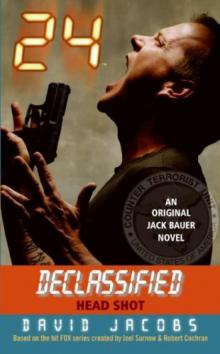 24 Declassified: Head Shot 2d-10
24 Declassified: Head Shot 2d-10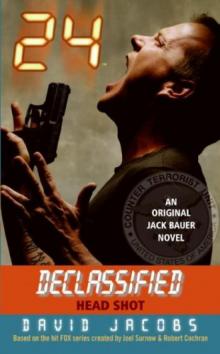 24 Declassified: 10 - Head Shot
24 Declassified: 10 - Head Shot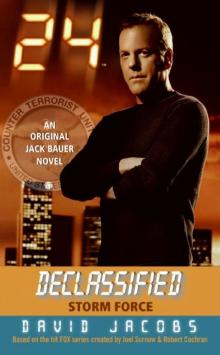 24 Declassified: 07 - Storm Force
24 Declassified: 07 - Storm Force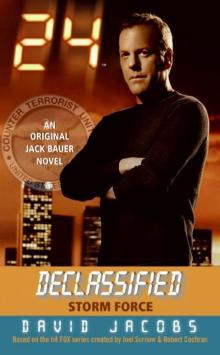 24 Declassified: Storm Force 2d-7
24 Declassified: Storm Force 2d-7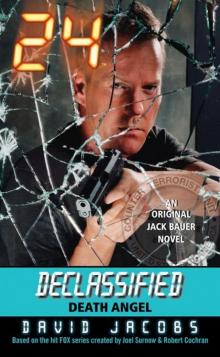 24 Declassified: Death Angel 2d-11
24 Declassified: Death Angel 2d-11